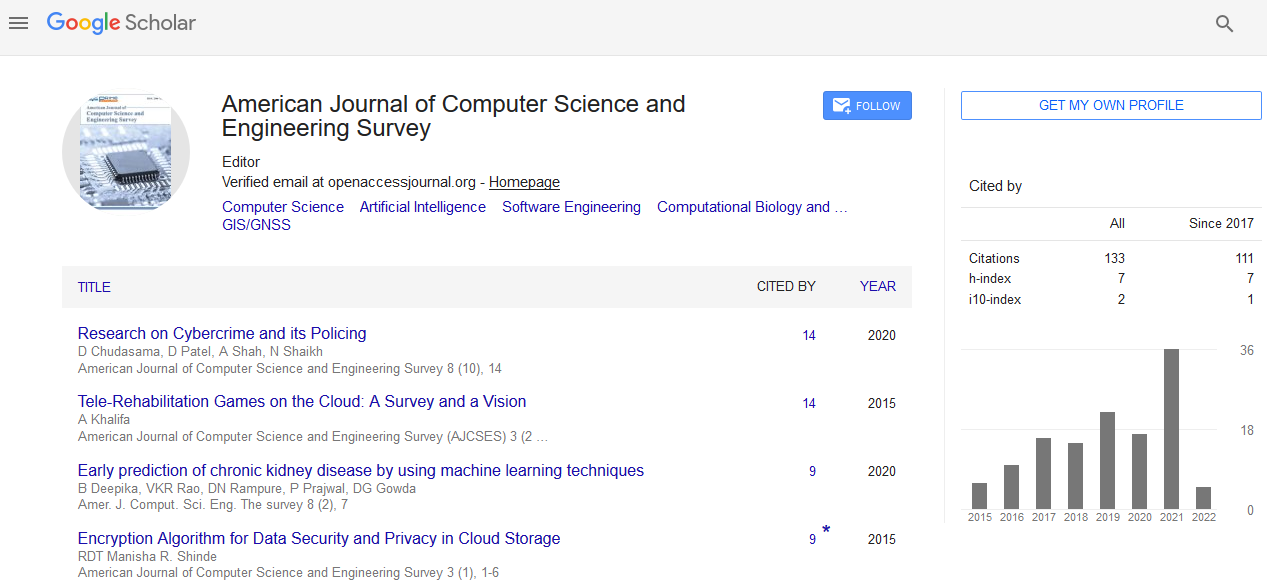Short Communication - (2024) Volume 12, Issue 2
Emerging Technologies: Pioneering the Future
Akira Ren*
Department of Computer Sciences, Nihon University, Japan
*Correspondence:
Akira Ren,
Department of Computer Sciences, Nihon University,
Japan,
Email:
Received: 29-May-2024, Manuscript No. IPACSES-24-20610;
Editor assigned: 31-May-2024, Pre QC No. IPACSES-24-20610 (PQ);
Reviewed: 14-Jun-2024, QC No. IPACSES-24-20610;
Revised: 19-Jun-2024, Manuscript No. IPACSES-24-20610 (R);
Published:
26-Jun-2024, DOI: 10.36846/2349-7238.24.12.11
Introduction
In the dynamic realm of technology, the landscape is
continuously evolving, driven by relentless innovation and the
pursuit of new possibilities. Emerging technologies represent
the vanguard of this evolution, promising to revolutionize
industries, redefine human experiences, and shape the future
in unprecedented ways. This article explores several cuttingedge
technologies poised to make a profound impact in the
coming years. Artificial Intelligence (AI) and Machine Learning
(ML) have already begun reshaping industries across the globe.
AI algorithms can analyze vast datasets, uncover patterns,
and make decisions with increasing accuracy and efficiency.
Machine learning, a subset of AI, enables systems to improve
their performance over time through experience. Applications
range from virtual assistants and recommendation engines to
predictive analytics in healthcare and autonomous vehicles.
As AI capabilities expand, its integration into everyday life
and business processes will deepen, driving productivity and
innovation.
Description
The Internet of Things (IoT) represents the interconnected
network of devices embedded with sensors, software, and
connectivity, enabling them to collect and exchange data.
IoT applications span smart homes, industrial automation,
healthcare monitoring, and environmental monitoring. As
IoT ecosystems grow, the ability to gather real-time data
from diverse sources empowers organizations to optimize
operations, enhance decision-making, and create personalized
user experiences. Originally developed as the underlying
technology for cryptocurrencies like Bitcoin, blockchain has
evolved into a robust tool with applications far beyond finance.
Blockchain is a decentralized ledger that records transactions
across multiple computers securely and transparently. Its key
features-immutability, transparency, and security-make it ideal
for applications such as supply chain management, digital
identity verification, voting systems, and secure peer-to-peer
transactions. Blockchain’s potential to streamline processes,
reduce fraud, and increase trust in digital interactions continues
to drive its adoption across various sectors. Augmented Reality
(AR) and Virtual Reality (VR) technologies merge digital content
with the physical world-AR or immerse users in entirely virtual
environments-VR. These technologies are transforming
industries such as gaming, education, healthcare, and retail.
AR enhances user experiences by overlaying digital information
onto real-world surroundings, while VR provides immersive
simulations for training, therapy, and entertainment. As
hardware capabilities improve and content creation tools
become more accessible, AR and VR are poised to redefine
how we interact with digital content and each other. Quantum
computing leverages the principles of quantum mechanics to
process information in ways that classical computers cannot.
Unlike traditional binary computing, quantum computers use
quantum bits or qubits, which can exist in multiple states
simultaneously. This parallel processing capability enables
quantum computers to solve complex problems exponentially
faster, such as simulating molecular structures, optimizing
supply chains, and breaking encryption codes. While still in the
experimental stage, advances in quantum computing promise
revolutionary advancements in fields where traditional
computing falls short. The Fifth-Generation (5G) of wireless
technology represents a significant leap forward in connectivity,
offering faster speeds, lower latency, and greater capacity
than its predecessors. Beyond enhanced mobile broadband,
5G enables transformative applications such as autonomous
vehicles, remote surgery, smart cities, and augmented reality
experiences. As global deployment of 5G networks continues,
the technology’s impact on communication, commerce, and
society at large is expected to be profound [1-4].
Conclusion
Emerging technologies hold the promise of unlocking new
possibilities, solving complex challenges, and improving the
quality of life for people worldwide. However, their adoption
and integration into society also raise ethical considerations, regulatory challenges, and concerns about privacy and security.
As these technologies evolve, fostering collaboration between
innovators, policymakers, and stakeholders will be crucial in
harnessing their full potential while mitigating risks. Embracing
a future shaped by emerging technologies requires vigilance,
adaptability, and a commitment to leveraging innovation for
the collective benefit of humanity.
Acknowledgement
None.
Conflict Of Interest
None.
References
- Pastena L (2014) Catenary-free electrification for urban transport: An overview of the tramwave system. IEEE Electrif Mag. 2(3): 16-21.
[Crossref] [Google Scholar]
- Li S, Mi C (2015) Wireless power transfer for electric vehicle applications. J Emerg Sel Top Power Electron. 3(1): 4-17.
[Crossref] [Google Scholar]
- Jang Y (2018) Survey of the operation and system study on wireless charging electric vehicle systems. Transp Res Part Emerg Technol. 95: 844-866.
[Crossref] [Google Scholar]
- Seriani S, Gallina P, Wedler A (2017) Dynamics of a tethered rover on rough terrain. Mech Mach Sci. 47: 355-361.
[Crossref] [Google Scholar]
Citation: Ren A (2024) Emerging Technologies: Pioneering the Future. Am J Comp Science. 12:11.
Copyright: © 2024 Ren A. This is an open-access article distributed under the terms of the Creative Commons Attribution License, which permits unrestricted use, distribution and reproduction in any medium, provided the original author and source are credited.

